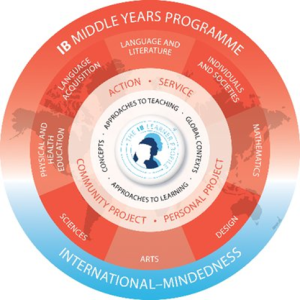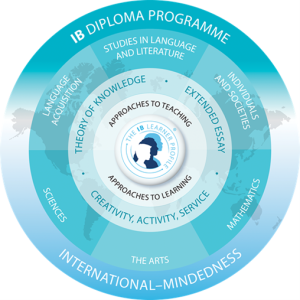
Educational structure
Our curriculum
Middle Years Programme (MYP)

The first five years of the ISE Secondary Department, for students who are aged 11 to 16 years, are based on the Middle Years Programme (MYP) of the International Baccalaureate. Within the school, year groups are referred to as MP1 to MP5.
The IB MYP provides a thorough study of various disciplines. It offers students a balanced curriculum with equal importance placed on all subject areas, as well as accentuating the interrelatedness between subjects.
The MYP Programme:
- addresses holistically students’ intellectual, social, emotional and physical well-being;
- provides students opportunities to develop a conceptual approach to understanding, along with the knowledge, attitudes and skills they need in order to manage complexity and take responsible action for the future;
- ensures breadth and depth of understanding through study in eight subject groups;
- requires the study of at least two languages (the language of instruction and an additional language of choice) to support students in understanding their own cultures and those of others;
- empowers students to participate in service within the community;
- helps to prepare students for further education, the workplace and a lifetime of learning.
MYP Subjects at the ISE
Students in the MYP follow a course of study in eight subject areas:
- Language & Literature — Offered in English and Dutch at the school, or as a home language with the support of theLanguage Coordinator.
- Language Acquisition — Offered in English, Dutch, French, or Spanish. Students in MP1-3 are required to study both Dutch and either French or Spanish, while students in MP4-5 may choose to study only one
- Mathematics — Students follow a general course of study in MP1-3, and then either Standard or Extended Mathematics in MP4 and MP5.
- Sciences — Students follow an integrated course of study in MP1-3, followed by separate lessons in Biology, Chemistry, and Physics in MP4 with a choice of two Sciences in MP5.
- Individuals and Societies — Students follow an integrated course of study in MP1-3, followed by separate lessons in Geography and History in MP4 with a choice of one in MP5.
- Arts — Students study both visual and performing arts in MP1-2, followed by separate lessons in Visual Arts, Theatre, and Music in MP3 with the option to continue with either one or two Arts subjects in MP4-5.
- Design — Students follow a general course of study in MP1-3 with the option to either continue with Design in MP4 and MP5 or opt for another Arts or Language in its place.
- Physical and Health Education — Students follow a general course throughout the MYP.
Interdisciplinary learning
The ability to use knowledge and skills from different subjects is a fundamental part of lifelong learning, and an integral skill if students are expected to face the challenges of our ever-changing world. The MYP Programme supports students in developing their interdisciplinary understanding through both informal instruction in the different subjects and through formal instruction of at least one interdisciplinary unit in each year of the Programme. In this way, students apply their disciplinary understanding across subjects to understand complex issues and ideas in critical and creative ways.
Service as Action (community service)
Action (learning by doing and experiencing) and Service have always been shared values of the IB community. Students take action when they apply what they are learning in the classroom and beyond. IB learners strive to be caring members of the community who demonstrate a commitment to service – making a positive difference to the lives of others and to the environment. Service as Action is an integral part of the programme through organized activities in all years of the programme, culminating in required involvement in both a local and a global service activity in the final MP5 year of the Programme.
The Personal Project
In the final year of the MYP, students are required to demonstrate the skills and concepts they have learned through a culminating project: the Personal Project. All MP5 students develop their project independently with support from both a teacher supervisor and our Personal Project Coordinator in order to produce a truly personal and creative piece of work that stands as a summative review of their ability to conduct independent work.
More information about the MYP Programme, including the MYP Subject briefs, can be found on the IB’s website here.
Diploma Programme (DP)

In the final two years of the ISE, Secondary School students who are aged 16-18 study the Diploma Programme (DP) of the International Baccalaureate. Classes are referred to as DP1 (first year of studies) and DP2 (second and final year of studies). Designed as a comprehensive two-year, pre-university programme, the curriculum allows its graduates to fulfil requirements of various national education systems and earn a Diploma to gain entry to universities around the world.
Subjects offered at the ISE Secondary School
Students normally select a combination of six subjects, three at higher level (HL) and three at standard level (SL), with a minimum of one subject from each subject group:
- Group 1 Studies in Language and Literature — Offered in English and Dutch at the school, or as a home language through the School Supported Self-Taught Literature course (SL only). These courses focus on the use and study of language and are designed for students who have experience and proficiency of using the language of the course in an academic context.
- Group 2 Language Acquisition — Offered in Dutch, French, Spanish and English for students with some previous learning of the language, or in Spanish Ab initio (SL only) for complete beginners. These courses focus on language acquisition and are designed to provide students with the necessary skills and intercultural understanding to enable them to communicate successfully in the language of study.
- Group 3 Individuals and Societies — Offered in History, Geography, Economics, Environmental Systems and Societies ( SL only) and Business and Management.
- Group 4 Sciences — Offered in Biology, Chemistry, Physics, and Environmental Systems and Societies (SL only), Design Technology (HL, SL).
- Group 5 Mathematics — Offered in Mathematics Approaches and Analysis or Mathematical Applications and Interpretations.
- Group 6 The Arts and Electives — Offered in Visual Arts or one additional subject from Groups 2, 3 or 4.
N.B. All choices are subject to demand, and to certain restrictions created by timetabling. Please see the DP Choices Website for more specifics about the course content and entrance requirements. More information about the DP Programme, including the DP Subject briefs, can be found on the IB’s website here.
Theory of Knowledge
Theory of Knowledge (TOK) is a required interdisciplinary course intended to stimulate critical reflection upon the knowledge and experience gained inside and outside the classroom. A key element in the IB’s educational philosophy, TOK seeks to develop a coherent approach to learning which transcends and unifies the academic subjects and encourages appreciation of other cultural perspectives.
Creativity, Activity, Service
Creativity, Activity, Service (CAS) encourages interest and commitment beyond the classroom, and provides a healthy counterbalance to the academics within a demanding school programme. Our goal of educating the whole person and fostering compassionate future citizens comes alive in an immediate way when students reach beyond themselves and their books. Students are required to commit themselves to activities and projects throughout the two-year DP course, covering all three of the areas named, and largely in their own time.
The Extended Essay
All Diploma candidates are required to undertake original research and write an Extended Essay of 4,000 words. This essay offers the opportunity to investigate a topic of special interest and familiarises students with the kind of independent research and writing skills expected at university.
Approaches to Learning (ATL)
A unifying thread throughout all MYP and DP subject groups, Approaches to Learning provide the foundation for independent learning by helping students learn how to learn. The IB outlines these skills and categorises them into five clusters:
- Communication
- Social
- Self-management
- Research
- Thinking
ATL skills are explicitly taught throughout all years of the MYP and DP programmes so that students can develop these skills in order to become responsible for their own learning.
IB 5-Year Evaluation Cycle
As an IB world school, the ISE is evaluated on a 5-year review cycle. During this period, the IB reviews all policies, curriculum overviews, sample student work, and the general functioning of the school during a rigorous review process culminating in a school visit to ensure that the school maintains the IB’s standards of teaching and learning. Additionally, the school is assigned an IB World Manager who produces reports with recommendations on various aspects of the school and works closely with the IB Coordinators.